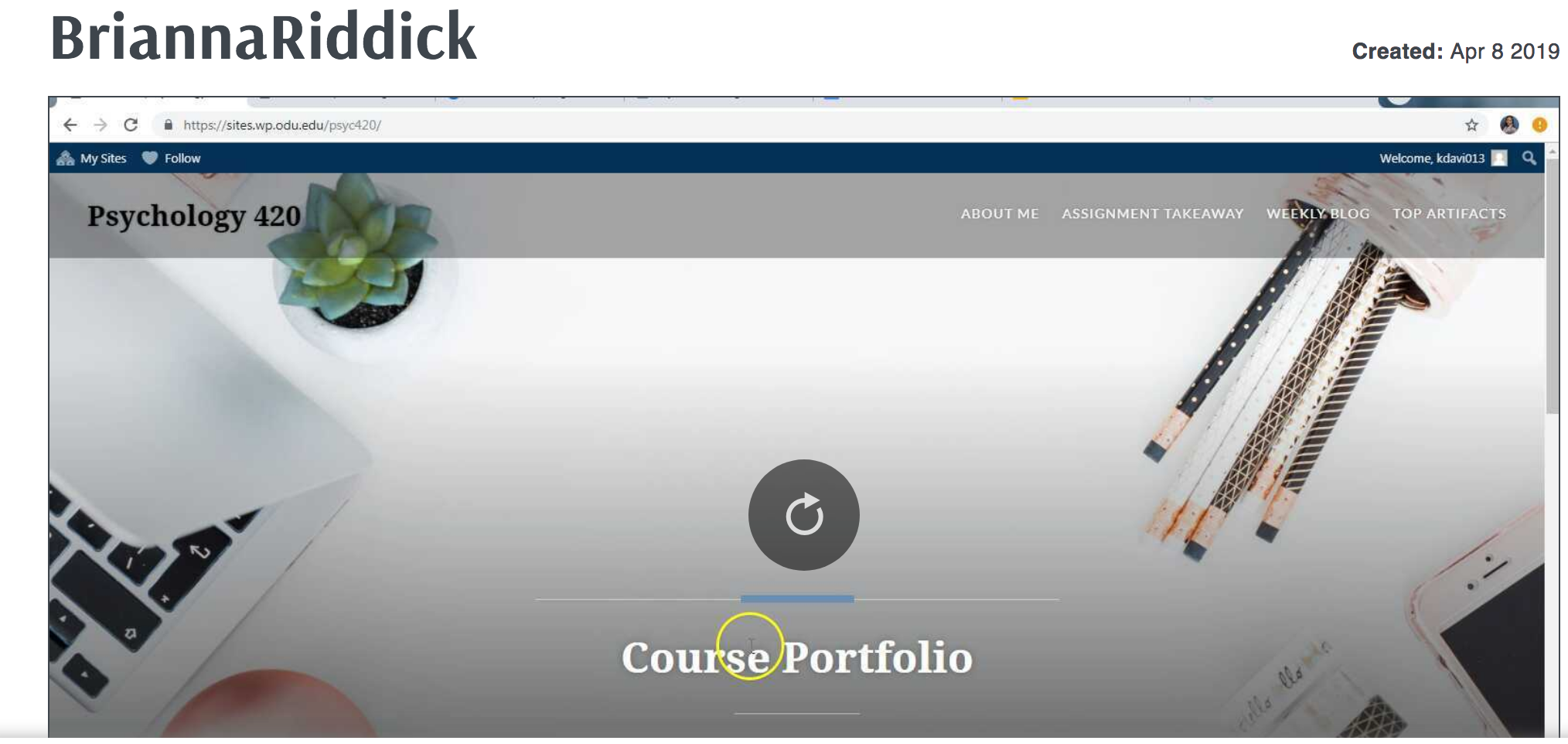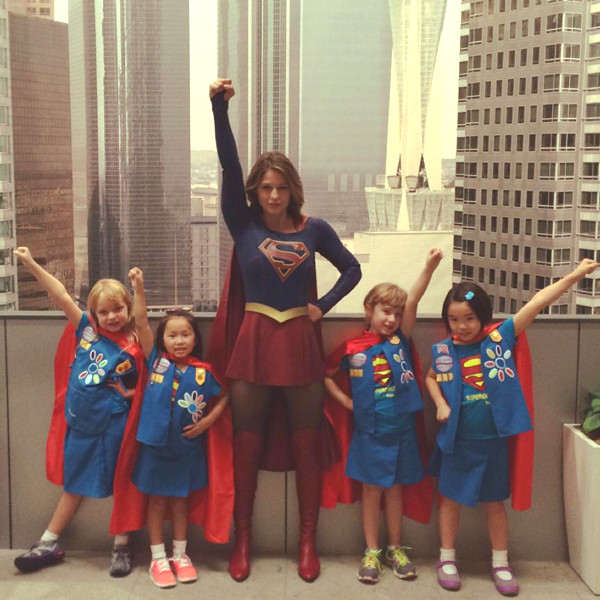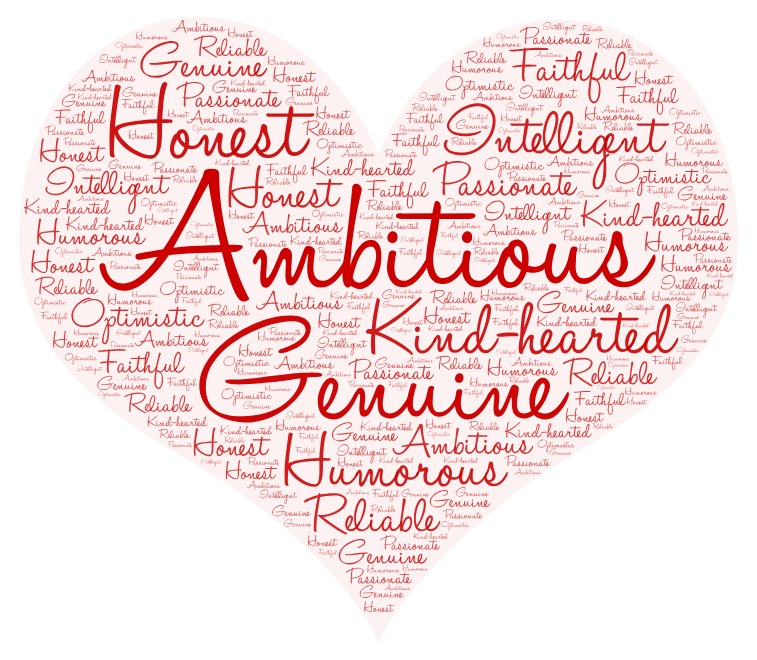Blog 11:
The question I selected for this was “Does my ePortfolio illustrate that I have made connections between the course content and relevant experiences outside of the course and/or between this course and other courses?”, which I feel like wasn’t exactly answered in the feedback video. I chose this question, because I felt like this was my biggest takeaway from the course. All of the material I learned was relevant. The assistant basically visually and technically provided feedback, which was helpful, but it didn’t focus on any of the blog’s content. The only thing I had to modify was completing the top artifacts page, which I did. Having an audience viewing my portfolio has enhanced my professionalism and writing quality. I know what is expected of me, so I’ve strived to exceed the standard.
 Portfolio Screenshot
Portfolio Screenshot
Blog 10:
I do feel like I have developed into a more culturally sound individual and gained valuable knowledge from this course. I did learn about how psychology is relevant in different cultures, how differences exist (especially for gender) in countries other than America, and made connections relating the class material to real life. My attitudes about social psychology have actually became more positive. I feel like the class has actually spurred an interest for me to explore this area even more. It’s definitely interesting seeing how psychology is applied in other cultures and how psychologically, other cultures are different. The assignment that sticks in my mind is the one where we explored advertisements from different countries seeing how gender roles were represented here in the U.S. versus somewhere else. This really opened my eyes to reality, and honestly just made me more thankful for being in the position that I am in. Seeing how unjust things are for women in strict countries made me really feel for them, and it’s sad to think about how so many voices go unheard. I intend to be an advocate for juveniles in my future career as a lawyer, because it was seeing how unfortunate situations here in America can ruin a child’s whole entire life. I’ve seen so many things on the news and in media, so I want to do what I can right here in my own home to help these voices be heard. If they can’t speak for themselves, I would like to be the one to do so. If I took this class again, the only thing I would do differently is work on time management. I do tend to work on things relatively close to the deadline, which is a bad habit I need to break. I’ve grown academically as a writer and in my critical thinking skills this semester. Taking a writing intensive course has benefited me in my other courses, as I feel that my writing skills have become even stronger. I look forward to taking what I’ve learned from this course into my future life. The image I decided to include I would say accurately reflects myself overall as a result of this course. It’s spurred new ideas and sparked a new interest for me. I find culture itself to be interesting and mixing this area with psychology really motivates me to study this more. This class has literally opened my brain to a whole new realm of psychology that I previously thought little about.
![]() Open-minded
Open-minded
Blog 9:
The top things I’ve learned from this course are types of cross-cultural research studies and why they are necessary, how culture plays a role in the concept of self, and the psychological gender differences across cultures. The assignments helped me to really feel engaged with the material that I read in the chapters, and the importance of these concepts is all discussed on the assignment takeaway pages. I reflected on the material and explained the point of completing the assignment. Blog 5 was about independent and interdependent self-construals which was similar to what had to be done in Assignment 2, where I wrote about the individualistic society that we lived in and how I believe this shaped our personalities. America is a very individualized country, so naturally, we all tend to focus on the self rather than the whole. In theories of personality, we had a whole chapter on cognitive development and attachment, which I also learned again in this course in Chapter 4. It’s interesting how everything ties in together. The image I chose to included represents me just summing up the key information learned from the course and making sense of it. I’ve learned a lot this semester, and I do feel like the information is definitely applicable to me in real life, both professionally and personally.
 Reflection and Review
Reflection and Review
Blog 8:
Reading this article reminded me of my family’s foreign exchange student hosting experiences. We’ve had children from various countries; China, Japan, Korea, Bolivia, Germany, and Italy, just to name some. It’s very interesting seeing how different these cultures are from us. Overall, the students from these cultures were much less expressive of emotions, especially about negativity than my sisters and I were and expressed happiness I would say more often than we did. They were almost always in a positive mood, regardless of the situation they were in. Being a guest might have contributed to this, but the students came from very strict, traditional families, where respect was very important and they aimed to please. They would never argue with an adult, especially their parents, and when upset, they made sure to do so in private, and if they were unhappy with something, didn’t express this discontent until asked about it. The students that we had very rarely expressed dislike for a food or activity. If they didn’t like something, they didn’t show it. America is a very individualistic society, so naturally we put ourselves first. We aren’t too concerned with the appropriateness of a behavior or how it may affect others. These other countries tend to be more collectivist and very big on harmony, so they try to avoid any potential conflict, even if that means doing so at their own disadvantage. I think the fact that other cultures have stricter social norms accounts for these differences. Here in America, it’s not that we have no respect, but we have no problem expressing how we are feeling. If we don’t approve of something, we might make a face and talk about it right then and there. People can be seen arguing and even cursing out a spouse in public, and I’ve seen disrespectful children just about everywhere. This just goes to show that Americans don’t uphold the same social values of those from traditional cultures. example, in America people will argue and act out in public when angry. When I was angry, it was possible that I might get loud or show anger in my face. The students we had I don’t recall ever seeing them angry or upset. If they were on the phone getting into an argument, for example, it was only possible to hear it if one would walk by their room. Other cultures do share these same emotions as us Americans, but they do tend to be more reserved about showing them and how they show them. The selected image represents how although we all have different cultures, emotions are universally understood. Looking at their faces we can assume how they’re feeling; it doesn’t matter that they come from a different country than us. Our ability to express and understand emotions is what unites us all.
 Universality of Emotions
Universality of Emotions
Blog 7:
Fairytales do reflect a shared set of values, but more so what we as a society idealize. Whether realistic or fair, they do typically stereotype males and females to fulfill a certain role. Producing films that don’t stereotype would serve a possibly more beneficial purpose, especially in society today. Our society is much less traditional than that of previous years, so it doesn’t make sense to try and reinforce how a female should be the damsel in distress and the male should be the one to save her. Traditional fairytales like Cinderella, Snow White, and Sleeping Beauty all reinforce the idea that the woman is helpless and needs a man. Modern Disney movies like Frozen, Moana, and Tangled give the female character more opportunity to be independent; she doesn’t need to rely on a male. I remember when Frozen first came out, there was a lot of talk about how different the plot was; it featured a strong female character and the story was focused on sister love, rather than a woman falling madly in love with a man, because he saved her from her misery. These more modern fairytales definitely empower females, and because they’re geared for children, they teach young girls how to be independent and not center their whole life around falling in love with the perfect guy. I think the movie that really grabbed my attention was Moana, because of how different it was compared to the traditional Disney princess movies. This young girl was capable of journeying across the sea on her own and literally saving her entire island. This is the kind of character that needs to be reproduced in future films, because it strays away from the idea of a man completing a woman, which I feel like is not only sexist but far from realistic. The selected image represents a strong female character, Wonder woman empowering young girls to grow up and become strong, powerful women as well. It’s important for young girls to have strong idols, rather than idols that inspire them to be helpless princesses in need of a man.
 Wonderwomen
Wonderwomen
Blog 6:
To satisfy the need of autonomy, which is something that actually happens naturally because I am a very independent and self-sufficient individual, I just remain true to myself. I’ve set academic goals for myself and I’m determined to achieve these goals. For instance, when I first attended ODU, I received a lot of commentary on my major, but because it’s something I’m passionate about, I stuck with my major. I’m not ignorant to other’s opinions, but I don’t let others make decisions for me. I meet the need for competence by challenging myself, yet knowing my limits. I take classes that interest me, but may not necessarily be an easy A. I love working towards something, so I do enjoy coursework that encourages me to grow academically. I feel like I am very capable of being successful in all my classes. I meet the need for relatedness by just indulging myself in the field and the course material. I’m studying psychology and am gaining experience in the field working as an ABA therapist. I’m working around others who share a common interest and networking to build professional relationships. These professional relationships are key to advancing in the field and maximizing my opportunities. The included image shows ABA therapists working with an autistic child. My reasoning for choosing this image, because I think it perfectly wraps up my psychological needs in an academic sense. All in all, my current job is the result of all my needs being met. I’m able to take what I learn through my coursework and my academic experiences and apply it to be relevant in the actual field.
 Working as an ABA Therapist
Working as an ABA Therapist
Blog 5:
- I am… intelligent
- I am… ambitious
- I am… optimistic
- I am… genuine
- I am… feminine
- I am… committed
- I am… mature
- I am… creative
- I am… determined
- I am… humble
Numbers 1, 2, 5, 8, and 9 all reflect independent self-construals and numbers 3, 4, 6, 7, and 10 reflect a more interdependent self-construal. Considering how I had five characteristics in both categories, I would say I’m a fair medium between the two. I am a very independent person, but I also have some interdependent traits. In this individualistic society of America, I feel like we’re conditioned to be self-focused but it’s my nature to be a very giving, unselfish person. I have a very good heart so while of course, I do put myself first I don’t do so at the disadvantage of others. A lot of the traits mentioned actually have something to do with those around me, even if they do reflect an individualistic mindset.
Proverbs…
- Independent: “Love yourself first”
- Interdependent: “Treat others how you would want to be treated”
I actually was able to think of more interdependent proverbs than independent ones, because I’ve heard them from a very young age up until now. Although we live in a very individualistic society, we’re constantly being preached to about doing what’s “good for the group”. We don’t preach selfishness and inconsideration, but instead stress the importance of loving our neighbors, which makes sense given that we all have to live with one another. If we all were selfish, independent beings we would have an extremely dysfunctional world, because people would only care about themselves and display complete disregard for others. Doing what’s good for yourself at the expense of others would create for a dangerous situation, as seen in Apocalyptic movies, where everyone practices “one for all”. I would also say that it’s in my nature to be somewhat interdependent. It’s the way I was raised and it’s what I’ve practiced throughout my teen-young adult life thus far, because it’s what I personally believe is morally right. The image included in this post sums up who I am as a whole. I am a very genuine person with a “heart of gold”. I care about others just about as much as I care about myself, which is rare to find in today’s world. Regardless of what I go through in life, I have a really big heart, which (sometimes a weakness) I think is one of my best qualities.
 A “Heart of Gold”
A “Heart of Gold”
Blog 4:
I am very content with the grade I received on the first exam. I take very thorough notes while reading and read over these notes prior to taking the exam. I did miss two questions, one I didn’t know and other I didn’t read very carefully. So in both cases, this shows test taking strategies I could implement for the next exam. I just need to be careful when reading the question, so I can determine exactly what it’s asking and review the study guide, which I did fail to do this time. Due to the way my school and work schedule is set up, I felt like I had to cram in time last minute to take the exam and cram in time last minute to study for it. I am a very hardworking individual, but I do tend to procrastinate; not necessarily out of choice, but because I have so much going on that I don’t plan perfectly. I have a planner so for next time I do intend on being more prepared for the exam, so hopefully I’ll be able to get that 100%. The selected image represents how busy my life is and how I have to juggle a lot of things, but so far I’m doing so successfully. Overall, I do manage everything I need to take care of.
 Time Management
Time Management
Blog 3:
For neuroticism I scored a 19, which was average. For extraversion, I scored a 35, which was in the range for a high score. For openness I got a 30, which was average. For agreeableness I got a 31, which was high and for conscientious I scored 44, which was a very high score. Being average for neuroticism means I am generally calm and handle stress well, but sometimes I experience intense emotions. I felt like this was relatable. I do manage things in my life well and I would consider myself to be very emotionally stable. But of course, there are experiences that cause my emotions to be at a high. For example, if I was going through personal family issues, I would be a lot more prone to experiencing sadness. Or because I am a full-time student and currently work two/three jobs, there are definitely times when I experience a lot of stress and I do tend to be in a bad mood, so I don’t have the patience or energy to tolerate anything. It could be something small that sets me off. But overall, I do handle my emotions very well; even if I am dealing with something, I don’t let it get the best of me. Being average for extraversion is a fair medium between extraversion and introversion, also accurate to myself. I think I’m a little bit of both; basically an introverted extravert. I do like to be in the company of others, but I do value time to myself. I don’t mind going out, but it’s not something I would necessarily enjoy doing every weekend. I do get drained out from going out, which is why I do need that time in the house to just relax. For openness, I scored average, so I am open to new things but I still like to stick to my own ways. This is true, because I am a very open-minded person but I still do have my own opinions that I do tend to stay true to. An example is that I’m not opposed to trying new foods, but often times when I go out to eat I get the same things that I know I like. My agreeableness score was in the high range, meaning that I am a compassionate person who is cooperative and tries to avoid conflict. I would say this description is true to me, because I am a very laid-back, go-with-the-flow kind of person. I don’t like arguing, if anything, I try to maintain peace. This is definitely how I am when it comes to relationships with people, whether it be friends, family, co-workers, etc. I do of course have my own ideas I tend to stick by, but I’m far from stubborn. I usually don’t mind changing my ways to accommodate someone else, as long as it’s within reason. I scored very high on the trait of conscientiousness, which after reading the description is definitely true of me. I am a well-organized and very goal-oriented person. I already knew this would be high, because I’m a virgo and this is something key to our personality; I am a perfectionist and I am very ambitious. I hold myself to a very high standard, especially when it comes to school. I’m pushing myself now to achieve a 3.8 GPA. I know exactly what I want in life and I do intend to get there, so giving up just is not a possibility. I just recently pursued two business ventures; a freelance makeup artist and freelance graphic designer. I’m self-taught in both areas and both are becoming successful, and I do plan on becoming even bigger in both. So, although I have a lot planned for myself, I do feel confident in my ability to achieve my goals. I know I have the drive and skills to do so. The image I included is a word collage of my personality traits. The heart shape is symbolic for the simple fact that I’ve really come to love myself and everything about me.
 My Personality
My Personality
Blog 2:
Some career-related values that are important to me are integrity, dedication, commitment, reliability, and positivity. There are more I could name but those are just a few. Integrity is big in the professional world, because being honest and having good morals is a must to be able to form positive relationships and pursue future endeavors. I plan to work in the field of law, so this might be the most important for myself and those I’m involved with in the workplace. The system was intended to protect the people and establish justice, so it makes sense to give just people that kind of power. Dedication is important, because you need to be willing to fulfill the duties of your job, whether it gets difficult or not. Being a lawyer is no easy task, and I’m aware that there may be times when I struggle with a case or even a client, but I need to remember why I’m doing it. Commitment goes hand in hand with dedication, because I need to remain true to my career goals and not give up. Reliability is another great trait, because people need to be able to depend on you to do the job. And positivity overall sums up the kind of person I aim to be, especially if I intend to be a lawyer. I need to feel confident in my abilities and maintain a positive outlook on the potential outcomes of the cases.
I think the main life experiences that produced and maintained these qualities in myself were school-related. I’m a very high achiever and I take pride in my work. I would rather fail knowing I tried than succeed knowing I cheated. Another reason some of these values are big to me are because my parents really instilled them in me. They taught me a lot of good values, which I’m thankful for. It’s my own experiences and knowledge that I’ve maintained and even improved on these values. I always aim to better myself in all aspects.
I decided to continue to higher education, because of the high standards I’ve set for myself and I know what I want to achieve in life. I want to be a lawyer, so having a certain level of education is necessary for the profession. My parents never had to really “force” college into my plan, because I already knew when I was younger where I was headed but they did serve as motivators. I’m so grateful to have such a supportive family in my career and education.
 Support System
Support System
Blog 1:
Overall, I think understanding and addressing cultural differences that may exist among us will allow me to become a more capable professional. We don’t all function the same, so it’s important to know how to communicate with everyone in a way that is specific to them. We don’t all speak the same language and share the same values, and being fully aware of this significantly eliminates any ignorance or misunderstandings in (and even outside) of the business world. I’ve never taken a class like this before, so I’m definitely excited to learn new things. I think culture is an important factor to take into consideration when studying the mind and behavior, so I’m looking forward to fully being able to understand this correlation. Furthermore, I want to be able to implement what I learn from this course and make it relevant to my everyday personal and professional life. The visual included with this post represents me as an eager to learn student. I naturally enjoy reading, so to make sure I’m understanding the material, I’m going to read everything thoroughly to maximize what I get from the course. I’m fully aware that what I put into the class is what I’ll get from the class.
 Studying
Studying